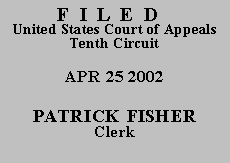

| ARTHUR TABB,
v.
MIKE DUNKLE |
|
Before BARRETT, PORFILIO, and
BRORBY, Senior Circuit Judges.
After examining the briefs and appellate record, this panel has determined
unanimously that oral argument would not materially assist the determination of
this appeal. See Fed. R. App. P. 34(a)(2); 10th Cir. R. 34.1(G). The case is
therefore ordered submitted without oral argument.
Arthur Tabb, a state prisoner appearing pro se, appeals the district court's decision dismissing his habeas petition brought pursuant to 28 U.S.C. § 2254. Exercising jurisdiction under 28 U.S.C. § 2253(a), we grant Mr. Tabb's request for a certificate of appealability,(1)
reverse the district court's dismissal of Mr. Tabb's petition, and remand for further proceedings.
In his §2254 petition(2)
filed with the United States District Court for the Eastern District of Oklahoma, Mr. Tabb claimed he was entitled to immediate release from state custody because Oklahoma incorrectly calculated his earned good-time credits. Oklahoma filed a motion to dismiss for lack of jurisdiction arguing Mr. Tabb's petition was barred by the one-year statute of limitations in 28 U.S.C. § 2244(d). Mr. Tabb failed to respond to Oklahoma's motion. Under the Local Rules of the United States District Court for the Eastern District of Oklahoma, failure to respond to a motion within fifteen days "constitute[s] a waiver of any objection" to the motion. E.D. Okla. Local R. 7.1(B). Therefore, the district court dismissed Mr. Tabbs petition.
We review the district court's dismissal of Mr Tabb's petition for failure to comply with Local Rule 7.1(B) for an abuse of discretion. Murray v. Archambo, 132 F.3d 609, 610 (10th Cir. 1998). In ruling, the district court must consider "(1) the degree of actual prejudice to the defendant; (2) the amount of interference with the judicial process; [and] (3) the culpability of the litigant." Hancock v. City of Okla. City, 857 F.2d 1394, 1396 (10th Cir. 1988). We require the district court to set forth an analysis of these three factors before dismissing a petition for failure to comply with a local rule. See Murray, 132 F.3d at 611; Cooper v. Saffle, No. 01-7107, 2002 WL 220631, at *1 (10th Cir. Feb. 13, 2002) (unpublished decision).(3)
"[O]nly when these aggravating factors outweigh[] the judicial system's strong predisposition to resolve cases on their merits is outright dismissal with prejudice an appropriate sanction." Hancock, 857 F.2d at 1396.
Here, the district court's minute order dismissing Mr. Tabb's petition did not strictly follow the factors listed in Murray. The district court cited the Murray decision indicating it was aware of the factors properly considered. The district court then found "applying the local rule [would] not prejudice the respondent or interfere with the judicial process." With respect to the third factor, the district court found Mr. Tabb was "culpable in failing to file a response" because Mr. Tabb had not requested additional time to file his response. The district court concluded by dismissing Mr. Tabb's petition "in light of the court's heavy prisoner caseload and in the interest of conserving judicial resources."
We conclude the district court's analysis was flawed and insufficient. The district court's order never discussed how Mr. Tabb's failure to respond within fifteen days caused prejudice to the government. Instead, the district court appears to have considered whether dismissal would prejudice Oklahoma or the court. Rarely, if ever, will a state be prejudiced by a district court's dismissal of a state prisoner's habeas petition. Instead, the appropriate inquiry is whether the petitioner's failure to respond prejudiced the state. See Murray, 132 F.3d at 611; Cooper, 2002 WL 220631, at * 1. Similarly, the district court erred in considering whether the dismissal would interfere with the judicial process. Instead, the court should have considered the extent to which Mr. Tabb's failure to respond interfered with the judicial process. Murray, 132 F.3d at 611; Cooper, 2002 WL 220631, at *1. Even assuming Mr. Tabb was completely culpable for his failure to comply with Local Rule 7.1(B), the district court did not explain how culpability, or any of the three factors, outweighed the "strong predisposition to resolve cases on their merits." Hancock, 857 F.2d at 1396. For these reasons, we conclude the district court abused its discretion in dismissing Mr. Tabb's petition under Local Rule 7.1(B).
Lastly, we recognize Mr. Tabb's motion to proceed in forma pauperis. As he has already paid his filing fee, the motion is moot.
We grant Mr. Tabb's certificate of appealability, REVERSE the order dismissing Mr. Tabb's petition, and REMAND this matter to the district court for further proceedings consistent with this opinion.
Entered by the Court:
WADE BRORBY
United States Circuit Judge
*. This order and judgment is not binding precedent except under the doctrines of law of the case, res judicata and collateral estoppel. The court generally disfavors the citation of orders and judgments; nevertheless, an order and judgment may be cited under the terms and conditions of 10th Cir. R. 36.3.
1. A certificate of appealability is required for a state prisoner, like Mr. Tabb, to appeal the denial of a § 2254 habeas petition. Montez v. McKinna, 208 F.3d 862, 866-67 (10th Cir. 2000). The district court denied Mr. Tabb's request for a certificate of appealability and Mr. Tabb renews his request on appeal.
2. Because Mr. Tabb challenges the execution of his sentence, rather than his conviction, his cause of action arises under 28 U.S.C. § 2241. Montez, 208 F.3d. at 865. A state prisoner proceeding under § 2241 must also obtain a certificate of appealability in order to proceed with his appeal. Id. at 867.
3. We recognize Cooper is not binding precedent under Tenth Circuit Rule 36.3. Nevertheless, it shows the consistency of our decisions.